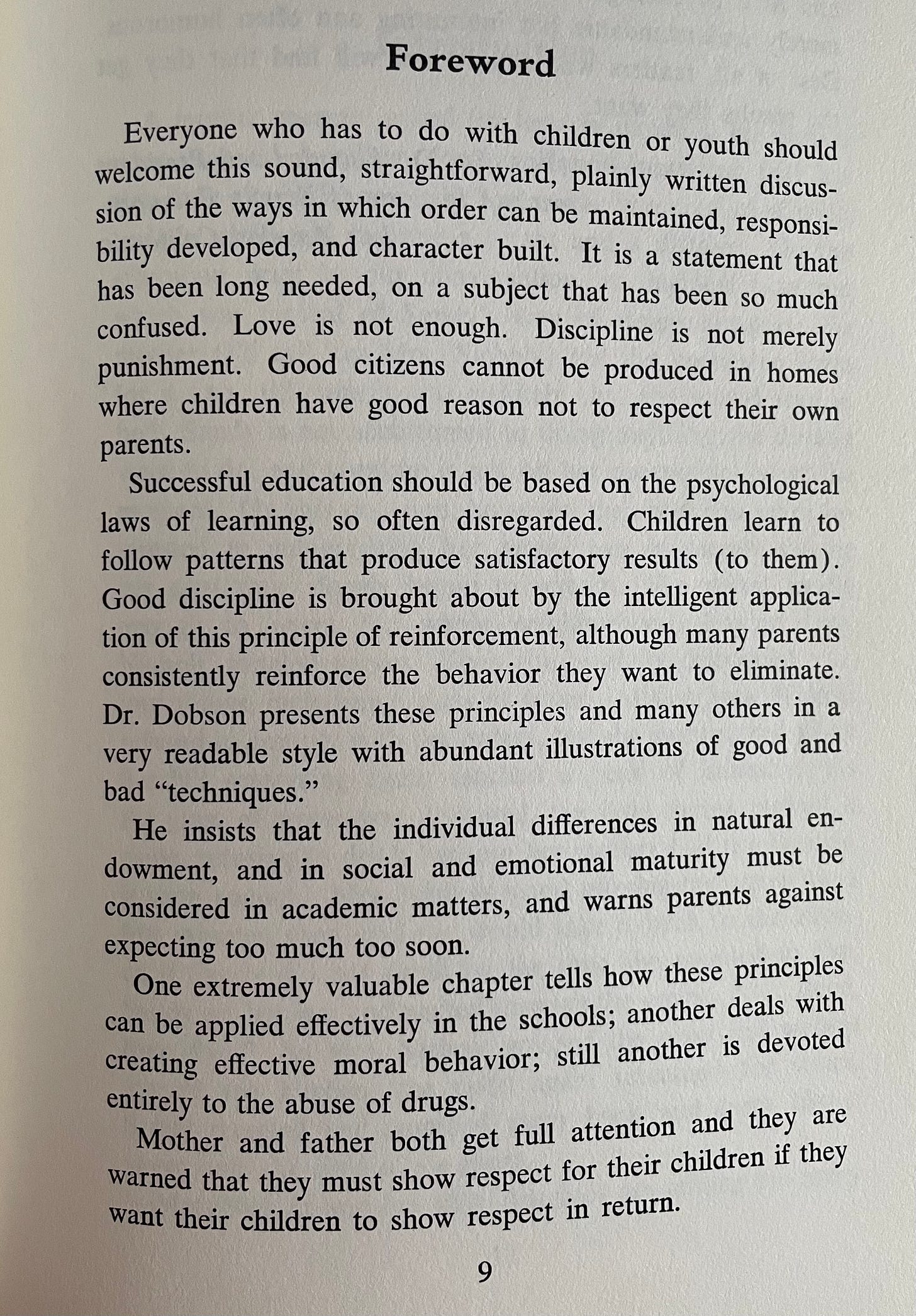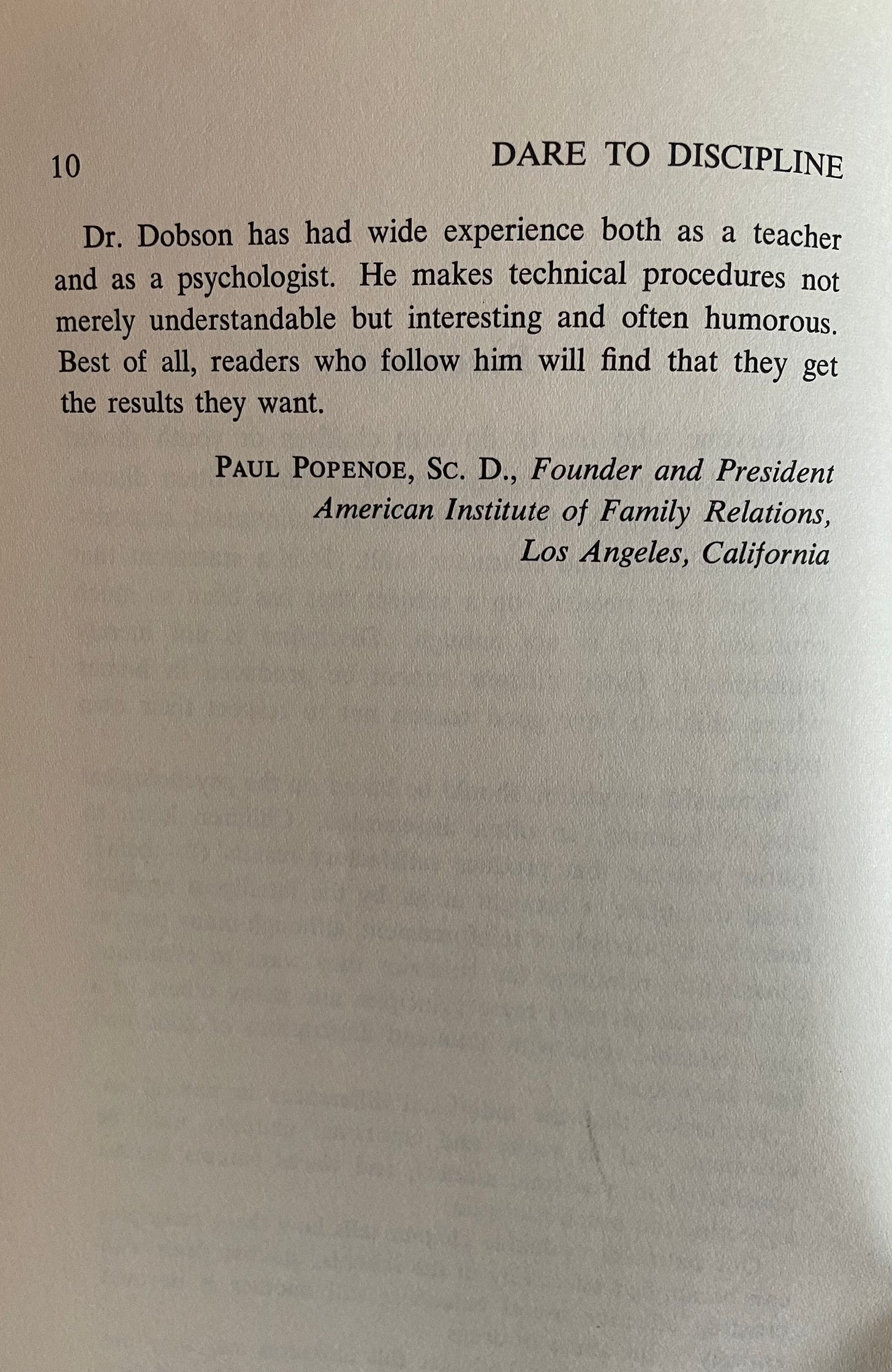Chapter 8: Children of the Positive Eugenics Movement
The hidden roots of white evangelical parenting manuals
STRONGWILLED is a reader-supported publication. The support of readers like you enable this survivor-led and survivor-centric project to continue on.
In the last chapter, we examined how the Religious Authoritarian Parenting movement gave its teenagers a false illusion of choice to reinforce submission to authoritarian figures instead of developmentally appropriate autonomy. Today, we look into how the RAP movement was started as a part of the positive eugenics movement in the United States.
While Dr. James Dobson, Billy Graham, Focus on the Family, Tim and Beverly LaHaye and many other conservative Christians have worked hard in recent decades to bury their connections to the positive eugenics movement in the United States, for a time the religious patriarchal community was keen to embrace strategies to encourage the promotion of the white race.
Eugenics has proliferated as a guiding philosophy in the United States, but what has often not been discussed is how this ideology eventually morphed into a religious authoritarian movement from the 1960s on. Instead of talking openly and explicitly about eugenics, patriarchal white men began to espouse the importance of focusing on the family, protecting children from outside influences, and strengthening the rigid gender roles and heteronormative white marriages—all of which they believed were necessary to expand the white race. And they used God, and religion, to make their arguments all the more effective, leading to multiple generations of evangelical children being born into a positive eugenics movement—without them ever knowing it.
Today we look at America’s most infamous eugenicist Paul Popenoe, who for decades counseled couples with the goal of encouraging same-race marriages, rigid gender roles, and increased procreation. And in the 1960s, he was also Dr. James Dobson’s boss, and taught him everything he knew about eugenics, and how to focus on growing the (white) family.
Paul Popenoe, born in 1888, started off as a journalist and naturalist who was eventually hired as the editor of The Journal of Hereditary, a project of the American Genetics Association (AGA) in 1916. The AGA was focused on bringing together scientists and bureaucrats to promote “eugenic ideas about racial purity with agronomy for the purpose of shaping both America’s farms and human society.”1 Popenoe went on to author the book Applied Eugenics in 1918, and co-authored the book Sterilization for Human Betterment.2
Eugenics in the early 20th century was about both biology and sociology. How could society mimic Darwin’s famous principles of survival of the fittest in the 19th and 20th centuries? How could scientists, government leaders, and national policies “encourage the reproduction of superior persons and discourage that of inferiors?”3 Chillingly, German eugenicists in the early 1930s identified Popenoe’s book on Sterilization for Human Betterment as one of their main sources for contemplating various measures towards racial purity, and by 1930 Germany and the U.S. were seen as the leaders in the world of national eugenics policies.4
Popenoe wrote a glowing report in The Journal of Hereditary on the Third Reich’s national eugenics movement, saying: “Hitler himself—though a bachelor—has long been convinced of race betterment through eugenic measures.”5 Popenoe was taken by the Third Reich’s plans to forcibly sterilize 400,000 people in one year alone (including 1/3 of the total inmates in Germany, those who were deemed feeble minded, people with schizophrenia and manic-depressive insanity, people with hereditary blindness and/or deafness, and more).6
Popenoe wrote wrote that “the present German government has given the first example in modern times of an administration based frankly and determinedly on the principles of eugenics. It has thus posed the question in a way that no other people can ignore.” He admired the fortitude of Hitler, who—in an age when races “are poisoning themselves” through intermarriage took action and declared that “any state which devotes itself to the care of its best racial elements must some day dominate the earth.”
Popenoe also approved of how Hitler recognized that negative measures are not enough to safeguard the racial values of a people. There must be an encouragement of “sound parenthood,” and Hitler wanted to make it easier for “fit” White German women to enter earlier into marriage and have larger families as a form of advancing the master race. Indeed, the Nazi party—which came into power partly on the platform that they would solve the issue of high unemployment—discouraged married women married from a career, and instead to focus on their main role: staying home, having children, and indoctrinating those children into the perfect citizens of a fascist eugenicist state. Popenoe, who wanted to see Hitler’s philosophy implemented in the US, writes about Hitler’s focus on the (white, German family): “While he points clearly to the need for financial reforms, such as the family wage, he seems to lay the greatest stress on educational changes and reforms in public opinion, that will promote earlier marriage and larger families among the fit.” (emphasis mine).
Just a few years after Popenoe was openly praising Hitler for his commitment to eugenics, the entire world saw the horrific conclusions of Hitler’s “experiment” played out on a global stage. As news about the holocaust of Jewish people and other minorities became public knowledge, it became socially advantageous for Popenoe to distance himself from his overt interest and support for the Third Reich’s ideas and methodologies. Popenoe, like many Americans before him, pivoted his career and adapted his eugenics message for a modern audience. Still obsessed with the ideas of growing a larger population of the “superior” White race, Popenoe started focusing primarily on the “positive” eugenics that Hitler also loved.7
As a part of his program, Popenoe had long recognized he would have to convince white women to stay in their patriarchal marriages, even as feminism slowly started to gain traction in the wider society. In the 1910s-40s, eugenics was the driving force behind not just sterilizing those deemed as “unfit” parents, but also encouraging couples towards same-race marriages. In the 1950s and beyond Popenoe told his staff to talk about hereditary compatibility as code for race, and much of his marriage advice boiled down to “marry your own.”8
Popenoe started his organization the American Institute of Family Relations (AIFR) in Los Angeles in 1930 and the local newspaper declared it the “first clinic for settling home trouble.” He authored the popular and long-running column “Can this Marriage be Saved?” in The Ladies Home Journal for decades. He was eventually called “The Father of Marriage Counseling” in the US and his eugenicist background was slowly forgotten while he appeared on television shows and published book after book with the goal of convincing women to stay married to their husbands and to commit themselves full-time to their roles as mothers.9
James Dobson was fresh from getting his doctorate of Psychology in 1967 when he went to work as Popenoe’s assistant at AIFR. Dobson had been horrified by what he saw happening in society in the 1960s, which he saw as a problem of “permissive” parenting and people rebelling against god-given hierarchal authority. A white, conservative man whose faith was of paramount importance to him and his identity, Dobson evidently had no qualms with going to work for an avowed atheist, seemingly because his goals and Popenoe’s seemed to nicely align.
As the eugenicist’s assistant, Dobson started his writing career publishing articles on male/female differences and the dangers of feminism. Homosexuality, equal rights for women, and the rise of “unfit” people in society were seen as the real dangers to a successful white marriage—instead of domestic violence, the abuse of women and children, or systemic oppression and poverty.10
Here is an example of a newspaper clipping mentioning Dobson’s lecture (entitled “Focus on the Family”) at Popenoe’s organization AIFR in 1972.11 He opens with a direct appeal to authoritarian parenting by making respect for authority the main goal of childrearing (and how parents must not be afraid of using corporal punishment to achieve this aim).
Dobson crafted and perfected his parenting philosophies in the late 1960s under the tutelage of Paul Popenoe, and for years afterwards continued to partner with AIFR. His lectures on daring to discipline, the strong-willed child, and focusing on the family eventually morphed into a video series seen by millions of people, then eventually into book deals. His first parenting book, Dare to Discipline, was published in 1970 and became a certified hit, selling millions of copies. And who did Dobson ask to write the forward for his book? None other than his mentor and boss, Paul Popenoe. After a few years in publication, Popenoe’s forward was quietly scrubbed, but here is the text in full:
It’s interesting to note that James Dobson has scrubbed all mention of Popenoe and AIFR from his personal history—even omitting this phase of his life from his official authorized biography. Dobson and other conservatives have gone to great lengths to distance themselves from “godless” eugenics policies, and yet the history of white evangelicalism is intertwined both with the positive eugenics movement and authoritarianism in general. With this history in mind, people who were raised in homes that utilized religious authoritarian parenting methods can start to piece together how their family and their personhood was weaponized for political reasons.12
For those of us who were born into the RAP movement from the 1970s on, learning to reclaim our autonomy and identity goes hand in hand with learning the history of the movement itself. For those of us born into these homes, the impact of these belief systems carries on in our very nervous systems. The pressure to conform to rigid gender and sexual identities, the corporal punishment used to ensure immediate obedience and compliance to authority, and the pressure to marry and have multiple children (without divorce being an option) has impacted millions and millions of people in the United States and beyond.
But for those of us born into RAP homes, we were told, over and over again, that we were simply Christians—people who believed and followed the word of God. Our existence centered around forming our identity in Christ, immediately obeying godly authority, distrusting outsiders and outside sources, and perpetuating the patriarchal systems we had been born into. But if you peel back the layers of religious language many of us were exposed to, underneath you find the bones of not just patriarchal Christian supremacy — but white supremacist idealogy as a core value. While some of us might not have heard explicitly racist or eugenicist language in our homes, it was the philosophy undergirding the parenting books, sermons, discipline methods, gender essentialism, and political media that permeated our homes—creating long-term damage on both a personal and systemic level.
Join us as we continue to unpack these impacts here at STRONGWILLED. In future chapters, we will be looking at the political lobbying career of Dr. James Dobson, the normalization of misery in marriage as the backbone of patriarchal family advice, and the rise of Christian nationalism as the biggest threat to democracy currently facing the U.S.
We understand that much of this information on the eugenics roots of the RAP movement might be new to folks. If you were raised in a home that utilized Religious Authoritarian Parenting methods, how did you see or experience pressure to center your life around obedience to authority and to upholding rigid gender norms, patriarchal marriages, and having multiple children?
From the preface of Applied Eugenics by Paul Popenoe. Accessed here: https://www.gutenberg.org/files/19560/19560-h/19560-h.htm
It is interesting to note Popenoe’s aside about Hitler being a bachelor—and thereby presumably not having children and expanding the Aryan race through procreation (which would be a negative thing in Popenoe’s book).
I originally accessed Popenoe’s entire article through this website, which has now been archived:https://web.archive.org/web/20230603070548/http://ldysinger.stjohnsem.edu/thm_599d_beg/10_eugenics/03_popenoe_praises_germany.htm
Popenoe might also be considered one of the fathers of purity culture. While not a Christian, he did work promoting sexual abstinence until marriage, as he felt this would help with the betterment of the races and keep people from race-mingling. We will be discussing purity culture in future chapters of STRONGWILLED. For now we highly recommend Sarah Moslener’s book Virgin Nation: Sexual Purity and American Adolescence for further reading.
See Family Matters: James Dobson and Focus on the Family’s Crusade for the Christian Home by researcher Hilde L. Stephens for more background on Popenoe, his views, and his relationship to Dobson. These insights comes from page 135-136.
Not only does white evangelicalism need to reckon with Popenoe’s influence, he’s also a figure that modern day relationship therapy needs to investigate (Krispin’s note, as a couples’ therapist).
I am indebted to the work of Audrey Clare Farley, who wrote this spectacular piece of journalism on the connection between white evangelicals and Popenoe in 2021.
Newspaper article and images accessed here: https://www.newspapers.com/image/7410199/
This entire article by Rick Pidock is worth reading (the scholarship is excellent!). But note the end where Pidcock profiles rising conservative stars like Kevin DeYoung who advocate for Christians to “Have more children and disciple them like crazy. Strongly consider having more children than you think you can handle. You don’t have to be a fertility maximalist to recognize that children are always lauded as a blessing in the Bible.”
















I think the most damning thing about Dobson's relationship to eugenics is that he's quietly disappeard any links, rather than openly apologizing. If he truly didn't believe in eugenics anymore there would be an easy to find, "Oh hey, I've realized this is wrong and we don't promote people who believe it anymore." His silence on the whole thing is deafening.
Side note: for my entire childhood my dad longed to have a copy of "Kittles" a very well known comentary. Our pastor had the volumes on his bookshelf and Dad was envious of them. This spring I discovered that Kittle was a Nazi and known anti-semite - and yet his commentaries are considered foundational. My dad was appalled to learn this news and I had to admit that we didn't have Google 30 years ago so how was he to know? BUT, somewhere, sometime, someone in a position of power in a seminary or Bible school DID know and didn't tell anyone and generations later pastors all over the country are taking notes from a Nazi and preaching his words from the pulpit.
Sometime in the 90's there was a new family in our church. They were home-schooling folks with a largish family. They invited us (my husband, myself, our two young children) to their home for a visit one day. I still remember her saying to me -- "you have great kids -- people like you should have more." I can't remember whether it was said out loud that "the wrong people are having big families." But somehow this idea is also part of my memory. This was a long time ago, and an awkward conversation. I don't remember how I actually responded.
Our children (now fully grownup) ARE pretty terrific people, but this was a weird conversation. Your article (and some other things I've read in the past) make it feel worse to me. My thought at the time wasn't really about eugenics, it was more about barely having the energy to be a good parent to the two children I had. And that it absolutely wasn't her business how many children were in our family. All this to say, this was a thing - it really was.